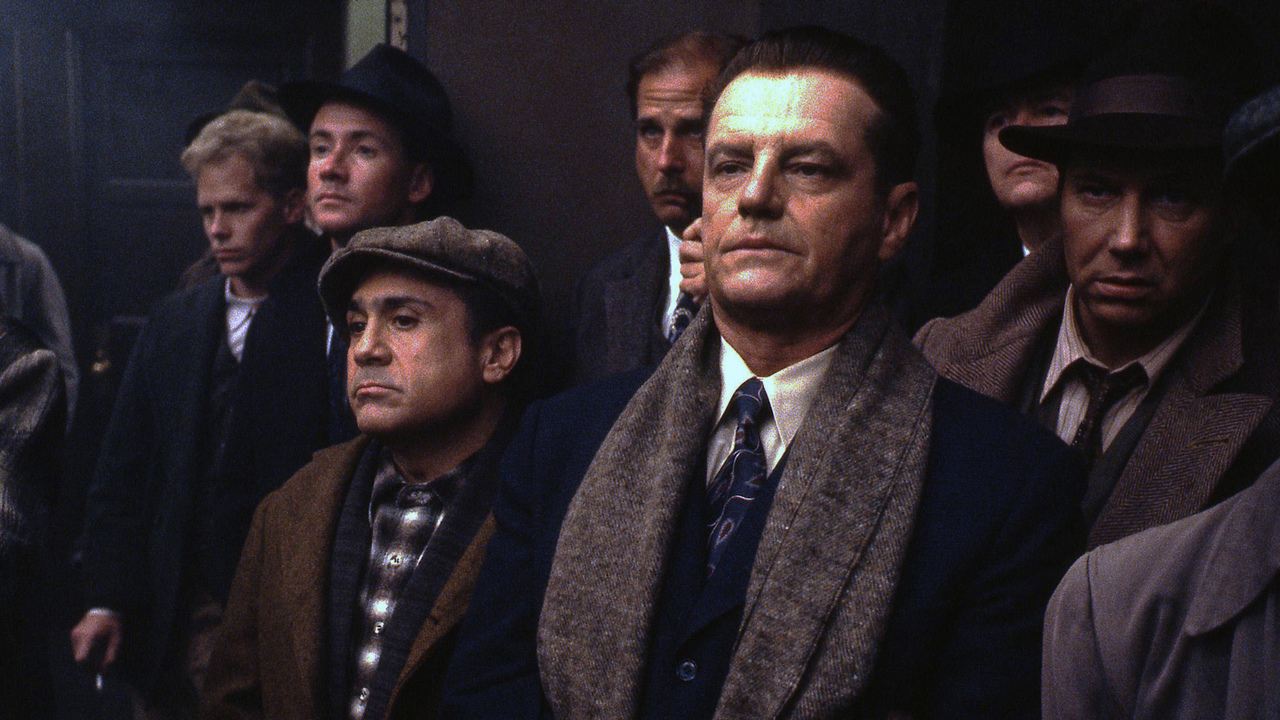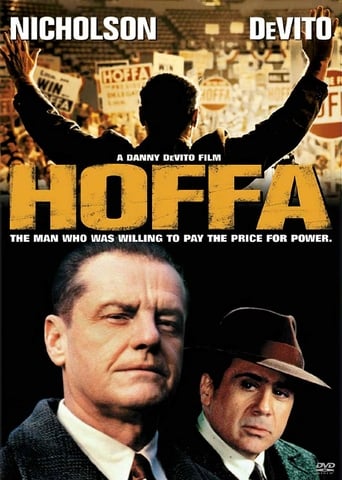

This is How Movies Should Be Made
... View MoreHighly Overrated But Still Good
... View MoreExcellent, a Must See
... View MoreThere is just so much movie here. For some it may be too much. But in the same secretly sarcastic way most telemarketers say the phrase, the title of this one is particularly apt.
... View MoreDanny DeVito's elegant masterwork film "Hoffa" tells an important story about America. Mr. DeVito's film is a Midrash, a riff, an interpretation of the life of union organizer and leader James R. "Jimmy" Hoffa. The narration unfolds richly through David Mamet's screenplay, excellent performances by the players including most of all Jack Nicholson and Mr. DeVito. By the way, J. T. Walsh shines again here.Cinematography by Stephen Burum and editing by Lynzee Klingman and Ronald Roose exfoliate the intricate production design by Ida Random and other production details. The people working on this film are all top notch.As I indicated, the film is not historical but interpretative. The narration is deliberately ambiguous and tensive, open to varying responses just like Mr. Hoffa himself. Still, I understand criticism of the film for its historical and even narrative flaws, but this is a mythic work, which has its place and serves a good purpose. In a way, it is a counter myth to those about John F. Kennedy and his brother Robert.For production design, acting, cinematography, editing, production values, and acting, Mr. DeVito's work deserves a solid ten. That does not mean the history is complete or accurate.
... View MoreHoffa is a film with two distinguished actors: Nicholson and DeVito. However, it is also a propaganda film of a rather vicious composition, with greatly reduces its quality. It tries to portray Jimmy Hoffa, one of the contemporary leading American union leaders. This is done in such a downgrading way, which is not substantiated by evidence, that it must be painful to all those who valued the man. In addition it implies that unions are interwoven with organized crime. It is hard to understand what motivated DeVito to direct and produce this film. Is it the desire to shock and provoke? Union busting? I don't know all the details (who does?), but imagine that Hoffa was an exceptional and controversial personality. In fact Stallone made a similar film "FIST" based on the life of Hoffa, which is much more sympathetic and nevertheless tactfully abstains from using Hoffas name. Let us first look at the facts, that emerge from the film Hoffa. Jimmy Hoffa started as a local union official with the International Brotherhood of Teamsters, a union of Transport personnel. He advocated a confronting method of collective bargaining, including an aggressive attitude of picket lines (which probably fitted the trade). In this way he succeeded in realizing results for the workers, although he also disregarded the orders of the national union board. There were also defeats. One time he lead a demonstration against a railway company, that employed a large bunch of thugs (private security?), who beat several of the demonstrators to death. Eventually he was elected president of the Teamsters. In the mean time a senatorial committee under the chairmanship of Robert kennedy accused him of having connections with communists and the mafia (a rather funny combination - but it is of coarse true that political figures can be affiliated with crime). Later Hoffa was accused of abusing the pension fund of the Teamsters, and convicted. However, the evidence is not really conclusive. Any way, after five years Hoffa was freed on parole. Shortly afterwards, he mysteriously disappeared. These appear to be the facts. Now the fictional (dramatized) additions of DeVito: at the start Nicholson (playing Hoffa) lighted the warehouse of a rebellious employer. Hoffa made a deal with the mafia, allowing them to rob the cargo of Teamster trucks. Hoffa managed the pension fund of the Teamsters together with the mafia. After his release from prison Hoffa wanted to regain power of the Teamsters and tried to murder one of its leaders. DeVito knows (so he tells us) that Hoffa was actually liquidated by his "former mafia mates". If for some reason you really truly hate unions, this is the film for you. Otherwise I recommend you to shun this portrayal. If you are just interested in collective bargaining or even sympathize with unionism, there are definitely more informative and realistic accounts. Try Salt of the Earth, Norma Rae, Bread and Roses, Harlan County War, Matewan, Man of Iron. Or take a look at the other films about social action, that I have reviewed here on IMDb.
... View MoreIn spite of a very accurate impersonation by Jack Nicholsen, this film is a failure because it completely whitewashes what a cretinous character the real James Hoffa was.Jimma Hoffa was charismatic, but he was also completely corrupt and played one of the biggest roles in allowing organized crime to take over one of the largest unions in the United States, and by doing so, bilking thousands of honest, hardworking people of pay and benefits.Read a history of Hoffa and you'll see a man who did everything he could to eliminate owner-operator truckers as a means of controlling all truckers. He wanted all drivers under the powerful fist of the union. You'll also see a predator who schemed to take over many existing enterprises by getting a foot in the door, striking, taking over and then allowing one or more of his thugs to exact tribute (often under their wife's name) in return for good labor relations.These are just a few examples of the corruption forced upon honest businesses by Hoffa and his criminal associates. Read history to know the real man, see the film to see a nice impersonation and a BS history.
... View MoreBefore I had seen Hoffa I was aware of the Union leader mainly for his disappearance and the jokes made about his last resting spot. My dad had always considered Hoffa a hero simply because he didn't buckle under to the big boys he fought them. Hoffa The movie captures the Essence of James R Hoffa perfectly. This is Nicholson's Finest role forget the Joker in Batman or Jack Torrence in THE SHINING. This is pure acting 100% You cannot tell where Hoffa the part and Nicholson the actor leave off. The movie moves from Flashbacks to Hoffa's last day on Earth and it makes you wonder about What happened to him. During the flashbacks we See Hoffa slowly emerging as a force within the Teamsters Union slowly gathering influence and power from the ranks of the working man. The Film fits the various Eras portrayed perfectly. It's like looking thru a window. The Corruption of Hoffa if you can call it that is slow and gradual and Hoffa's War With Bobby Kennedy is simply fantastic film making Devito didn't want to spoil the scene with words so he used the actual Hoffa Kennedy exchanges word by word word for word. And Nicholson must've studied that footage intently as he captures Hoffa's Every movement and even his eyes down to the rapid movements that Hoffa did. Devito knows his stuff and Proves it here. Great Film that deserves to be remembered as a true original CLASSIC! Just like the original James R. Hoffa a original classic.
... View More